Saudi Arabia Starts All-Out Oil War: MbS Destroys OPEC By Flooding Market, Slashing Oil Prices
With the commodity world still smarting from the Nov 2014 Saudi decision to (temporarily) break apart OPEC, and flood the market with oil in (failed) hopes of crushing US shale producers (who survived thanks to generous banks extending loan terms and even more generous buyers of junk bonds), which nonetheless resulted in a painful manufacturing recession as the price of Brent cratered as low as the mid-$20's in late 2015/early 2016, on Saturday, Saudi Arabia launched its second scorched earth, or rather scorched oil campaign in 6 years. And this time there will be blood.
Following Friday's shocking collapse of OPEC+, when Russia and Riyadh were unable to reach an agreement during the OPEC+ summit in Vienna which was seeking up to 1.5 million b/d in further oil production cuts, on Saturday Saudi Arabia kick started what Bloomberg called an all-out oil war, slashing official pricing for its crude and making the deepest cuts in at least 20 years on its main grades, in an effort to push as many barrels into the market as possible.
In the first major marketing decision since the meeting, the Saudi state producer Aramco, which successfully IPOed just before the price of oil cratered...
... launched unprecedented discounts and cut its April pricing for crude sales to Asia by $4-$6 a barrel and to the U.S. by a whopping $7 a barrel in attempts to steal market share from 3rd party sources, according to a copy of the announcement seen by Bloomberg. In the most significant move, Aramco widened the discount for its flagship Arab Light crude to refiners in north-west Europe by a hefty $8 a barrel, offering it at $10.25 a barrel under the Brent benchmark. In contrast, Urals, the Russian flagship crude blend, trades at a discount of about $2 a barrel under Brent. Traders said the Saudi move was a direct attack at the ability of Russian companies to sell crude in Europe.
Confirming the obvious, Iman Nasseri, managing director for the Middle East at oil consultant FGE said "Saudi Arabia is now really going into a full price war."
The draconian cuts in monthly pricing by state prouder Saudi Aramco are the first and clearest indication of how the Saudis will respond to the break up of the alliance between OPEC and Russia, which as we noted earlier, dumped MbS on Friday in a stunning reversal within OPEC+. Talks in Vienna ended in dramatic failure on Friday as Saudi Arabia’s gamble to get Russia to agree to a prolonged and deeper cut failed to pay off.
And the second indication that the OPEC oil cartel is now effectively dead, came a few hours later when Bloomberg again reported that in addition to huge price cuts, Saudi Arabia was set to flood the market with a glut of oil to steal market share and capitalize on its just announced massive price cuts as the kingdom plans to increase oil output next month, going well above 10 million barrels a day.
In addition to slashing prices, Saudi Arabia has privately told some market participants it could raise production much higher if needed, even going to a record of 12 million barrels a day, according to Bloomberg sources.
But before hitting a stunning 12mmb/d, Saudi production will first rise above 10 million barrels a day in April, from about 9.7 millions a day this month: "That’s the oil market equivalent of a declaration of war," an unnamed commodities hedge fund manager said.
Meanwhile, as Bloomberg correctly notes, "with demand being ravaged by the coronavirus outbreak, opening the taps like that would throw oil market into chaos."
According to preliminary estimates, with Brent trading at $45, a flood of Saudi supply as demand is in freefall, could send oil into the $20s if not teens, in a shock move lower as speculators puke on long positions in what Goldman calls periodically a "negative convexity" event.
Oil traders are looking to historical charts for an indication of how low prices could go. One potential target is $27.10 a barrel, reached in 2016 during the last price war. But some believe the market could go even lower.
What is the logic behind the Saudi decision?
According to one take, the shock-and-awe Saudi strategy could be an attempt to impose maximum pain in the quickest possible way to both Russia and other producers, most notably shale, in an effort to bring them back to the negotiating table, and then quickly reverse the production surge and start cutting output if a deal is achieved.
While that's certainly possible, it has already been tried once - back in 2014/2015 - and the result was humiliation for Riyadh as not only shale came out stronger, but Russia had no problems absorbing the lower prices. Instead, the most likely outcome is that Russia will be able to withstand a shock price far longer than Saudi Arabia, which has budgeted for a Brent price of $58/b for 2020 (which would lead to a 6.4% budget deficit). A realized price which is roughly half that - should the Saudi strategy work out as planned - would lead to social unrest and government turmoil in Saudi Arabia, and may explain why earlier today Saudi crown prince MbS launched another crackdown on dozens of royals and army officers following the arrest of powerful princes, who may compete for the throne once the public mood in Saudi Arabia turns nasty in the coming weeks.
Incidentally, those wondering what is the worst case scenario for oil prices, consider that Brent traded at an all time low of $9.55 a barrel in December 1998, during one of the rare price wars that Saudi Arabia has launched over the last 40 years... similar to just now.
Could the price drop even lower now? Yes: back then there was no coronavirus pandemic destroying global oil demand.
One final point: with 10Y Breakevens driven almost entirely by the price of oil...
... once Brent craters on Monday to the mid-$30s or lower, the accompanying implosion in 10Y yields could make the record plunge in yields seen on Friday a dress rehearsal for what could be the biggest VaR shock of all time. And since QE will only send yields even lower, perhaps it's time for the Fed to add oil futures to stocks among the expanded securities it plans on purchasing as part of QE-5 to avert the next deflationary crisis which may have just started.
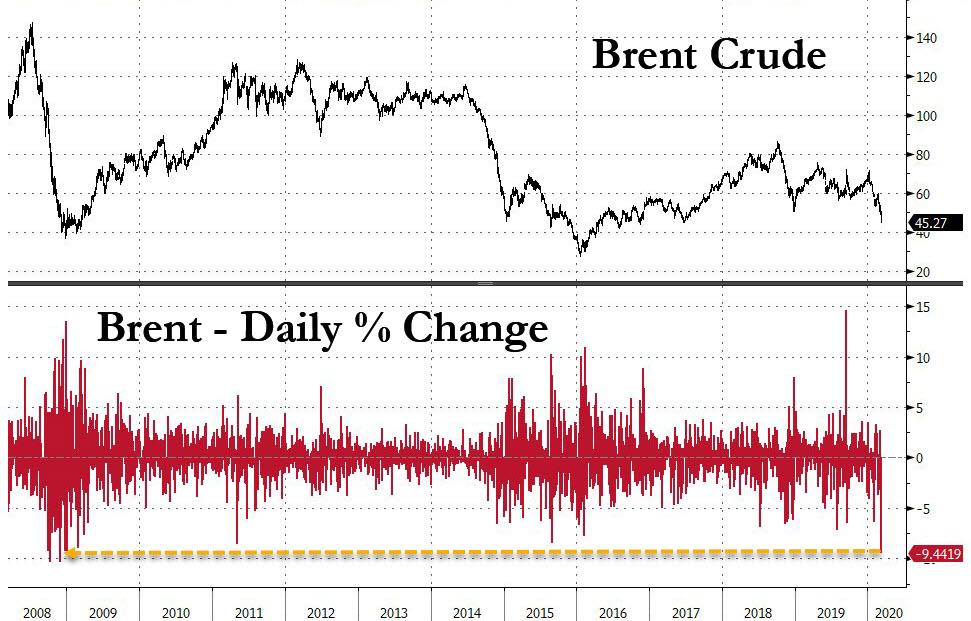
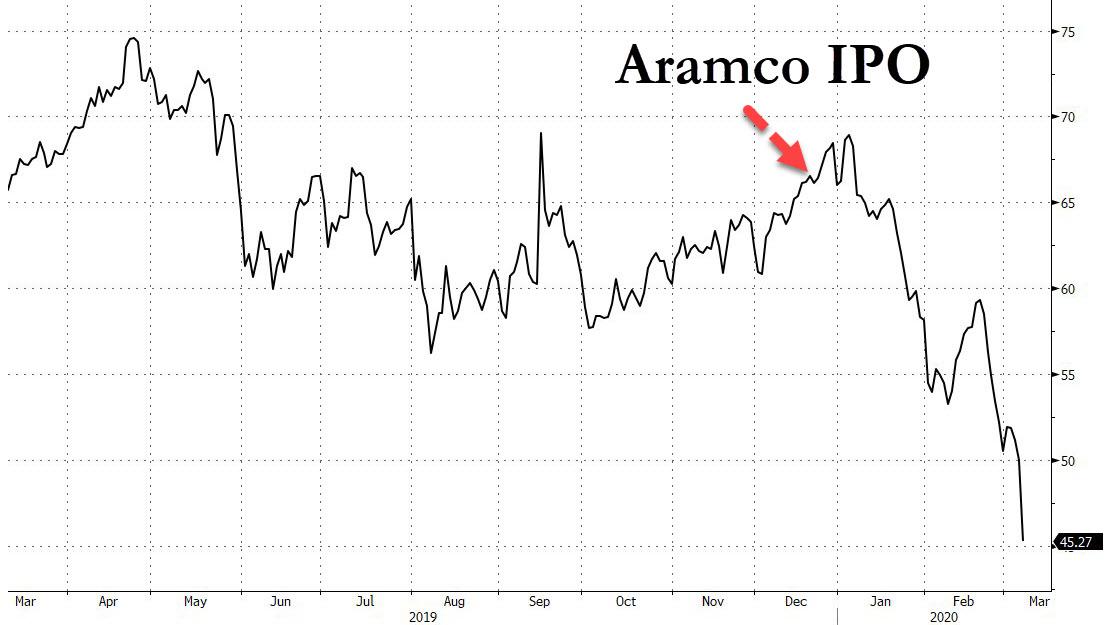
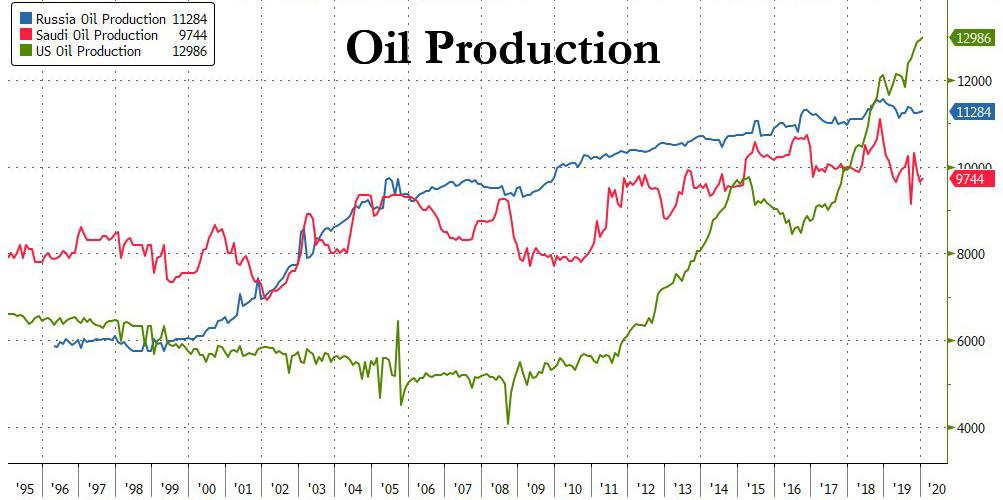
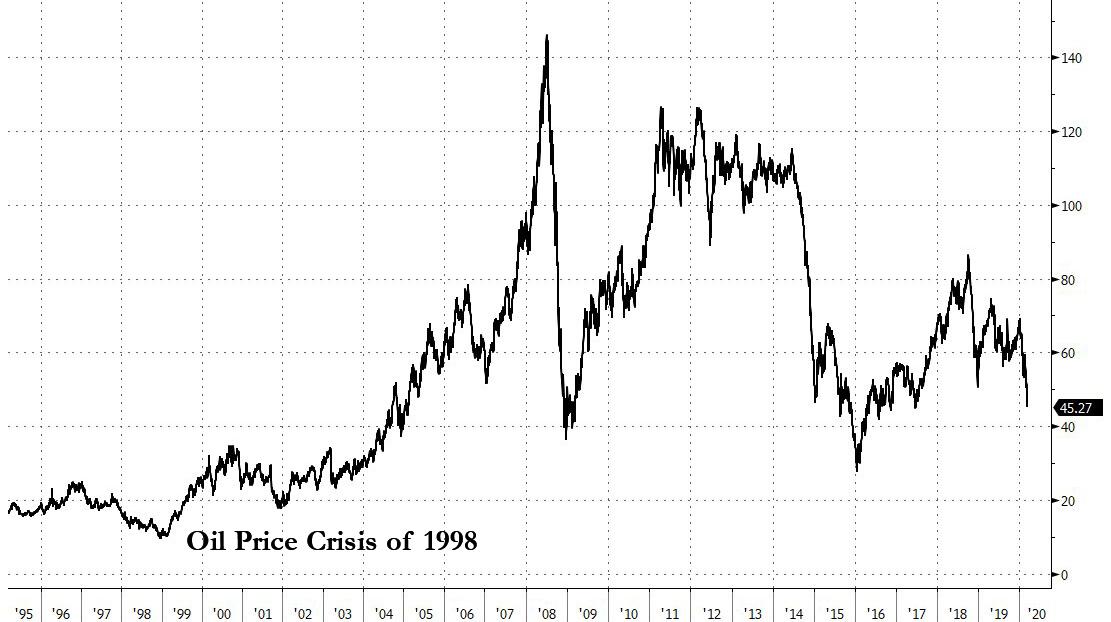
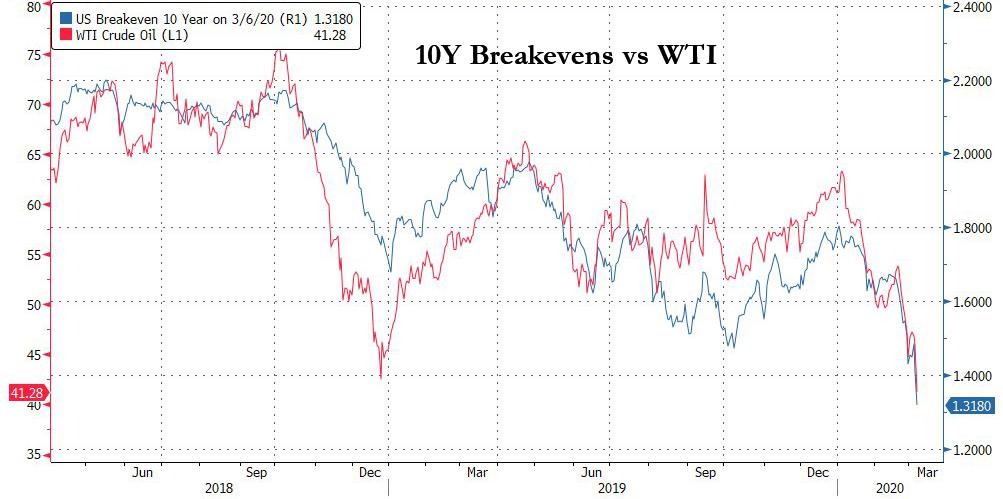




Geen opmerkingen:
Een reactie posten